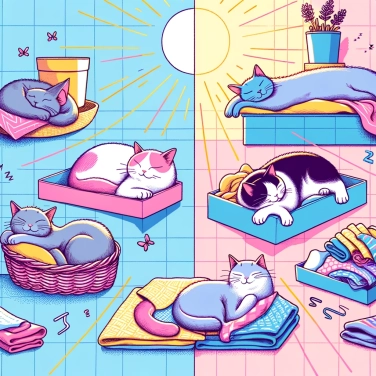Cats sleep a lot in a day because they are nocturnal predators and need to recharge their batteries to be ready to hunt and play when they are active.

Cats spend about 12 to 16 hours a day sleeping, which accounts for nearly two-thirds of their day. This significant need for rest primarily stems from their condition as natural predators: their bodies are programmed to conserve as much energy as possible in order to focus it during intense physical activities like hunting, playing, or chasing. Essentially, they recover for longer because their active periods are short but very intense. Furthermore, even though domestic felines are much less subjected to this wild lifestyle, they retain these biological habits inherited from their wild ancestors.
Cats are predators that primarily hunt by ambush. This hunting method requires them to engage in intense and rapid physical activity, which quickly depletes their energy reserves. To compensate, they spend time resting to conserve their energy between hunts. Sleeping a lot allows them to remain alert and have enough strength to quickly seize their prey at any moment. In short, less wasted effort, more efficiency: cats prefer to conserve their energy wisely rather than waste their precious energy needlessly.
Cats alternate between two main phases of sleep: light sleep and deep sleep. Most of the time, they doze in light sleep: easy to wake, with ears and whiskers always alert. During deep sleep, or REM sleep, they completely relax their muscles, breathe faster, and you may notice their paws or whiskers twitching slightly – a sign that they are probably dreaming. Unlike us, the feline sleep cycle is short, often lasting just around 25-30 minutes. During a normal day, your cat will frequently cycle through these short phases to achieve those famous endless naps.
Older cats sleep much more than their younger friends, as their bodies need a lot of recovery. A kitten also spends a large majority of its day sleeping, sometimes up to 20 hours, to promote its rapid growth and brain development. Some health issues also influence sleep patterns: joint pain, chronic illnesses, or hormonal disorders (like hyperthyroidism) can cause a cat to sleep more or, conversely, to be more restless and less rested. Finally, if your cat suddenly sleeps much more or less than usual without any apparent reason, it is often a sign that a quick visit to the veterinarian may be necessary.
Domestication has significantly changed the natural rhythm of our domestic cats. No longer needing to hunt for survival, they have a lot of free time to fill. As a result, they spend a large part of the day dozing quietly, enjoying the warm and cozy comfort of the couch or bed. Their sleep patterns often become aligned with the lifestyle of their owners, adapting their naps based on the availability of the humans they share their daily lives with. By living exclusively indoors, some cats develop a very fragmented sleep, alternating between short waking periods and multiple brief naps throughout the day rather than long sessions of rest.
Even while they sleep, cats remain vigilant: their ears can rotate to catch even the slightest suspicious sound!
Young kittens and older cats sleep even more, sometimes reaching up to 20 hours a day.
Unlike us, cats experience several phases of light sleep throughout the day, during which they can wake up very quickly.
The purring emitted by cats during their sleep can have a relaxing effect, potentially reducing their stress and improving their physical recovery.
Yes, it is possible to some extent. Introducing regular play sessions in the evening and maintaining a precise feeding routine can help your cat adopt a rhythm closer to yours. However, significant differences in sleeping habits remain normal compared to humans.
Yes, that is completely normal. Older cats tend to sleep more as their metabolism slows down, which increases their need for rest and recovery.
A sudden and significant change in your cat's sleeping habits may indicate an underlying health issue. If your feline seems lethargic, refuses to eat, or displays other unusual behaviors, a veterinary consultation is strongly recommended.
Cats are naturally crepuscular, which means that their peak activity occurs typically at dawn and dusk. This behavior is inherited from their original hunting patterns when they primarily stalked prey during these times.
An adult cat sleeps on average between 12 to 16 hours a day. However, depending on the age, health condition, and temperament of the animal, this duration can vary significantly.

0% of respondents passed this quiz completely!
Question 1/5